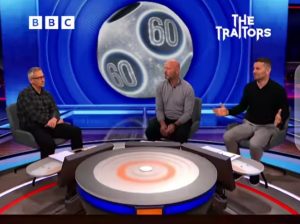Gary Lineker and Alan Shearer Stunned by Leeds Star’s Unexpected Premier League Admission

Gary Lineker and Alan Shearer, two iconic figures in English football and hosts of the popular podcast The Rest Is Football, were recently left stunned during a candid discussion on the challenges faced by Premier League players. The moment of surprise came when the duo explored which opponents current players considered their toughest in the league—prompting a surprising yet insightful answer from one of Leeds United’s rising stars.
The discussion began with the hosts reminiscing about their own challenging encounters on the pitch. Both had illustrious careers as forwards in the English top flight and faced some of the toughest defenders in the game’s history. Lineker, for example, has often cited Paul McGrath as the most difficult opponent he ever faced, while Shearer has recounted gritty battles with Arsenal legend Tony Adams. So, when they turned the topic toward the current generation, they expected names like Virgil van Dijk or Rodri to dominate the conversation.
However, the response from Leeds striker Joël Piroe caught them completely off guard. Since joining Leeds from Swansea City, Piroe has been pivotal in the club’s resurgence. Known for his intelligent movement, clinical finishing, and composure under pressure, the Dutch striker has seamlessly adapted to the demands of Premier League football. His inclusion in the discussion added a fresh and honest perspective—and he did not shy away from sharing it.
In a moment that left Lineker and Shearer momentarily speechless, Piroe named Erling Haaland as the toughest opponent in the Premier League. While it might seem unusual for a striker to cite another striker as his most daunting adversary, Piroe’s explanation provided clarity. Rather than basing his assessment solely on direct matchups, Piroe emphasized the psychological and performance-driven pressure of keeping pace with a forward like Haaland, whose goal-scoring feats continually raise the bar for others in the league.
What made his statement even more intriguing was Piroe’s broader outlook on competition. He elaborated that the challenge in the Premier League doesn’t only come from defenders or individual players, but also from the standard set by entire teams. He specifically mentioned West Ham and Brighton as two of the toughest and most tactically demanding teams he has faced or studied closely since entering the league. According to Piroe, these clubs have developed an intense and highly organized playing style, making matches against them some of the most mentally and physically taxing.
West Ham, under David Moyes, have built a strong, resilient side that combines physicality with attacking flair. Their European successes and disciplined domestic form have made them a formidable side. Brighton, on the other hand, have earned widespread admiration for their attractive, possession-based football under Roberto De Zerbi. Their ability to press high, rotate players, and exploit spaces with tactical finesse has transformed them into one of the Premier League’s most unpredictable and dangerous opponents.
Piroe acknowledged that playing against such teams demands a high football IQ. Whether it’s breaking down Brighton’s layered midfield or dealing with West Ham’s counter-attacking strength, he believes these games test every facet of a forward’s game. His comments reflect a deeper appreciation of the Premier League’s complexity and competitiveness—not just in terms of individual battles, but the strategic wars that unfold every weekend.
Despite his relative newness to the Premier League, Piroe’s impact at Leeds has been undeniable. He played a key role in the club’s promotion push, scoring 19 goals in the Championship, and has continued his form in the top tier. Under Daniel Farke, he has not only led the line but also adapted to fluid attacking roles alongside teammates like Georginio Rutter, often swapping positions to destabilize opposing defenses.
His choice of Haaland, Brighton, and West Ham as the most daunting challenges reveals much about his mindset. Rather than being intimidated, Piroe uses these benchmarks to motivate himself. He studies Haaland’s off-the-ball movements, examines Brighton’s tactical build-up play, and prepares for West Ham’s physical intensity—all in a bid to evolve as a complete forward.
Gary Lineker and Alan Shearer, seasoned veterans of the game, appreciated the thoughtfulness behind Piroe’s remarks. They agreed that the landscape of the Premier League has changed drastically since their playing days. The modern player, especially someone like Joël Piroe, must not only be technically sound but also tactically aware and mentally resilient to succeed.
In conclusion, Joël Piroe’s revelation during the podcast was more than just a surprising name drop—it was a window into the mind of a modern footballer navigating the pressures of one of the world’s most demanding leagues. His respect for players like Erling Haaland and recognition of clubs like West Ham and Brighton underscores the high standards of today’s Premier League and highlights Piroe’s ambition to rise among its elite.